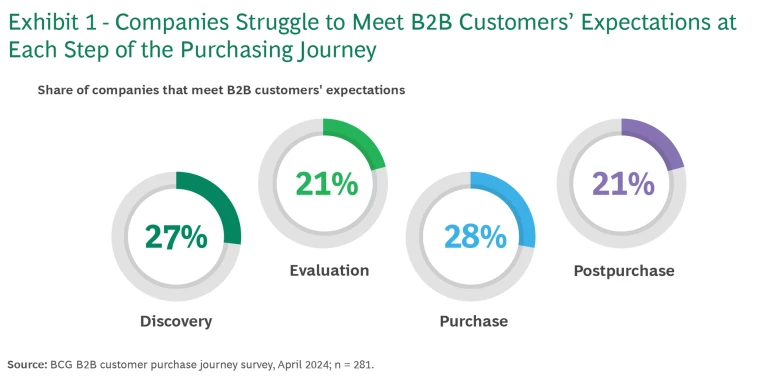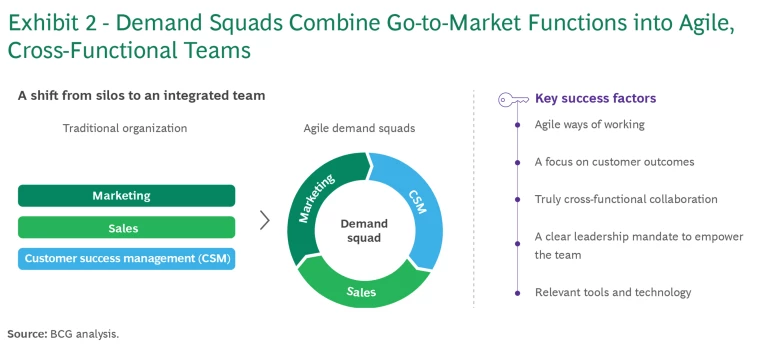B2B go-to-market functions are becoming less than the sum of their parts. Marketing, sales, and customer success teams tend to work in entrenched silos with their own processes and metrics, few of which have a meaningful impact on the bottom line. This approach creates an extremely disjointed, inefficient, and frustrating experience for customers trying to buy a company’s products and services. And for companies, the impact is far worse: lost revenue opportunities.
One promising solution is to redesign go-to-market functions into demand squads: cross-functional teams that combine sales, marketing, and customer success into a single unit. These squads can work in a far more customer-centric way, orienting every action and process around identifying and meeting customer needs. They can also be more agile, helping companies run tests to identify new revenue opportunities and capture them quickly. For that reason, demand squads are particularly relevant for tech companies, which live or die on their speed of delivery.
Critically, demand squads require no additional budget, resources, or material changes in the organization. They offer a straightforward, immediately accessible way for B2B companies to improve their marketing performance—and their bottom line.
A Growing Gap Between B2B Processes and Customer Expectations
We recently benchmarked tech companies on how long it takes to produce a long-form piece of content—a blog post, event brochure, or piece of sales collateral—used across marketing and sales channels. To produce relatively straightforward content like this, the average tech company takes six months. Top-decile companies can get the same content out in about six weeks. (Small, agile companies can get it out in about six days.) In other words, top-decile performance results in a 70% improvement over the average in speed to market—time that can be redeployed to other value-creating activities.
Digital is creating even more opportunities to transform B2B marketing, with customer touchpoints along the entire end-to-end purchasing journey. But customers are not happy with the interactions that most companies deliver. In a recent BCG survey, B2B customers said they want richer and more tailored interactions at every stage of the journey, from initial discovery to evaluation, purchase, and postpurchase. Yet B2B companies struggle to meet those expectations. (See Exhibit 1.)

The silver lining is that digital interactions also create the kind of data that companies, if they’re set up right, can use to better understand customer behavior. Yet most companies still function in operational silos. In our benchmarking analysis, 52% of B2B marketers cited a lack of alignment between marketing and sales functions as a key barrier to realizing the full potential of data-driven marketing. These companies are letting digital insights fall through their fingers and are missing out on opportunities to better understand and meet customer needs.
To be clear, CMOs aren’t to blame for this; it’s more of an organizational issue. But the current siloed structure of the marketing, sales, and customer success functions creates multiple obstacles to serving customers effectively:
- Limited Accountability. Marketing teams focus on isolated departmental metrics like lead generation, not bottom-line outcomes.
- Unclear Priorities. Only 16% of B2B companies use marketing data for real-time decisions, leading to poor prioritization of resources.
- Insufficient Mandate. Marketing often lacks influence in strategic decisions, leaving critical business choices to other stakeholders.
The Power of Demand Squads
The solution is to reorganize the sales, marketing, and customer success functions into demand squads: small, agile, cross-functional teams that make marketing more efficient and effective by streamlining processes. (See Exhibit 2.) So if it’s a matter of producing a simple blog post, for example, demand squads get everyone aligned and participating in the same discussion, dramatically accelerating the process by streamlining time-consuming review cycles and iterations.

Equally important, demand squads align metrics to financial outcomes, so that marketing, sales, and customer success all have a clear set of expectations and there’s transparency regarding current performance. Squads also have the leeway to experiment by analyzing problems, developing hypotheses for growth, and proving—or disproving—them through rapid, iterative pilots, typically working in short sprints of two to three weeks.
Squads can be organized by geographic region, customer segment, or other dimensions of the business. In all cases, however, they look at the entire end-to-end customer journey, collaborating across functions and focusing on execution. This structure offers several key advantages:
- Better Integration Among Teams. Rather than individual departments operating in silos, demand squads integrate all go-to-market activities and ensure that decisions put the customer foremost.
- Explicit Priorities. The squad structure ensures that teams can test potential measures and understand potential tradeoffs to make the right decision for the overall enterprise, not just individual departments.
- Strong Accountability for Results. To boost accountability, squads focus on a single “hero metric” linked to actual business outcomes, such as revenue growth or improved yield on marketing spend. The squad is accountable for moving that number—and nothing else. Its members think more like business owners and less like bureaucrats.
- Clear Communication. Getting everyone on the same team makes communication faster and clearer. Detailed plans for each initiative, along with debriefs afterward, help teams capture and communicate information clearly.
- A Data-Driven Mindset. Analytics and measurement capabilities ensure that squads make decisions based on accurate, objective information. They continually develop hypotheses for new initiatives and run pilots to determine how well they work, with a test-and-learn approach of “fail fast and fail cheap.” While most organizations run one or two tests each quarter, leading players test 20 use cases per month.
- Speed. Teams meet regularly and collaborate, using an agile approach that dramatically accelerates processes. Companies can typically start generating results in weeks.
Stay ahead with BCG insights on marketing and sales
Key Success Factors
Companies seeking to implement demand squads should focus on a few key areas:
- Agile ways of working, including iterative feedback loops and a willingness to challenge the status quo
- A central focus on customer outcomes
- Truly cross-functional collaboration, rather than formal handoffs among various teams
- A clear leadership mandate to empower the team, giving members the autonomy to run tests, develop hypotheses, and make decisions grounded in bottom-line impact
- Integration of tools and technology sufficient to get started (the perfect solution isn’t required to begin the effort)
Real-World Results
Several clients have reported meaningful value creation through this effort. For example, a large technology company created two demand squads, one for each of its core geographic markets. The squads identified, tested, and scaled 16 growth use cases, generating one-year incremental revenue gains of 15% to 30% in the company’s main business segments.
At another company—a diversified insurance firm—teams created two demand squads. Working in two-week sprints, the squads looked at the entire end-to-end sales funnel and identified “pinch points” where customer leads would stagnate or drop off. They launched more than 30 marketing initiatives that they tested and scaled, leading to a three-fold improvement in yield among brokers and agents. Those measures resulted in an increase of more than $250 million in annual premiums.
Ask Yourself
B2B business leaders should ask themselves a few key questions:
- How long does it take us to get a basic piece of marketing content approved and published?
- How many tests do we run a month to find new growth levers across the customer journey?
- When we last missed our P&L targets, how did our teams perform against their individual targets or KPIs?
- Have marketing, sales, and customer success leaders ever made a joint decision about prioritization or tradeoffs?
If you’re like many B2B companies, you’re probably not happy with the answers—and you’re not alone. Restructuring your go-to-market functions into cross-functional demand squads can help you improve, starting today.






